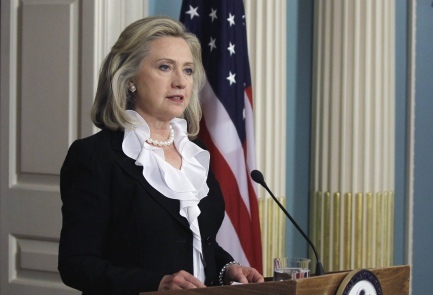US in last-ditch effort to divert Palestinian UN bid
Clinton warns Palestinians: The route to a lasting solution lies in Jerusalem and Ramallah, not in New York • Dennis Ross and David Hale return to hammer out deal acceptable to PA, Israel and the EU, but Palestinians say it's "too little too late."
U.S. Secretary of State Hillary Clinton: "The route to peace lies in Jerusalem and Ramallah, not in New York,” | Photo credit: AP |
U.S. Secretary of State Hillary Clinton reiterated on Tuesday the U.S.'s stance against the unilateral Palestinian bid for statehood at the U.N. later this month, while representatives from around the world convened in Israel in an attempt to find a last-minute formula to convince the Palestinians to return to direct negotiations. “The only way of getting a lasting solution is through direct negotiations through the parties and the route to that lies in Jerusalem and Ramallah, not in New York,” Clinton told reporters. “We are redoubling our efforts with not only both sides but with a broad cross-section of the international community to create a sustainable platform for negotiations that can produce the two-state solution that we seek.” “Our hope is that we get the parties back into a frame of mind and a process where they will actually begin negotiating again,” Clinton said. U.S. envoys Dennis Ross and David Hale returned to Israel on Wednesday in a last-ditch attempt to dissuade the Palestinians from proceeding at the U.N. They will be joined by EU foreign policy chief Catherine Ashton and former British prime minister and current special envoy to the Quartet Tony Blair. German Foreign Minister Guido Westerwelle was also in Israel this week. All parties have arrived to try to convince the Palestinian Authority to drop its unilateral bid for statehood and instead return to direct negotiations. One way to bring the Palestinians back to the negotiating table, the international mediators believe, would be an Israeli declaration of a building freeze on all settlements for the duration of negotiations. Officials in Israel rebuffed the suggestion, citing the fruitless 10-month freeze that ended last year. A senior aide to Palestinian President Mahmoud Abbas told Reuters the plan was still to seek full U.N. membership for a Palestinian state, despite the new U.S. mission. Reuters reported that Senator John Kerry, the Democratic chairman of the Senate Foreign Relations Committee who is close to the Obama administration, said there was little chance of stopping the Palestinian bid. “I think the only thing that might change the dynamic now is a major proposal by Israel on the table with respect to the peace process,” Kerry told reporters. Meanwhile, Washington has warned both Israel and the Palestinians not to make rash decisions “the day after” Sept. 20., when Palestinian Authority President Mahmoud Abbas is expected to ask the U.N. General Assembly to recognize Palestinian statehood. U.S. Ambassador to the U.N. Susan Rice said on Tuesday that she hoped the Palestinians' plans would include “the day after.” Rice was apparently referring to the Palestinian intention of using the “observer state” status it would acquire from winning the General Assembly vote to pursue criminal charges against Israel at the International Court of Justice. In Jerusalem, officials have drawn up a long list of potential punitive measures against the Palestinians' unilateral move, but no particular course of action has been chosen. “If the Palestinian leadership opts to make unilateral gestures, Israel will consider changing the status of east Jerusalem and the settlements in Judea and Samaria,” Deputy Foreign Minister Danny Ayalon said on Tuesday at a forum in Beersheba. Another option being weighed is to halt the transfer of the Palestinian Authority's tax revenue, which Israel collects and then transfers to the Palestinian Authority. The U.S. has specifically asked Israel not to take either step, or any other measure that could prevent negotiations in the future. Foreign Minister Avigdor Lieberman on Wednesday said that all the concessions Israel had made to the Palestinians were taken for granted and were not interpreted as gestures of good will. Speaking at an agriculture conference at Kibbutz Revivim about the steps taken by the Palestinian Authority to obtain recognition of statehood, Lieberman said that he can say "with full confidence" that as soon as a unilateral resolution at the U.N. passes, there will be "serious and harsh ramifications," Israel Radio reported. The foreign minister expressed his hope that common sense would prevail regarding the statehood bid and that Israelis and Palestinians would be able to move forward in negotiations. Meanwhile, The New York Times reported on Tuesday that Palestinian negotiator Saeb Erekat said the Palestinian leadership was weighing the strong urging of both the Arab states and the Europeans to turn only to the U.N. General Assembly, where the Palestinians are certain to have majority support, and not to the U.N. Security Council, where the U.S. could veto any resolution. Erekat told a strategy session of the Arab League that Abbas “said that if we receive something from the Arabs and the Europeans we will put it to the leadership to study it.” But he said the Palestinian Authority had not yet committed itself to a course of action, The New York Times reported. Erekat also said Abbas would fly to Amman, Jordan, on Wednesday for a meeting about the issue with Blair. Blair and the Europeans “said they have some ideas and we are waiting to see the ideas formulated,” Erekat said. “We don’t intend to confront the U.S. or anyone else for that matter,” he said. “We want to present the U.N. vote as an opportunity for all of us to preserve the two-state solution.”
0 comentarios